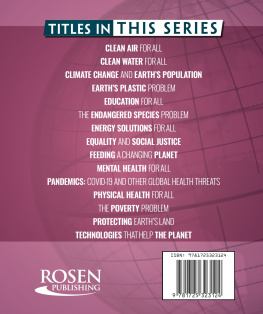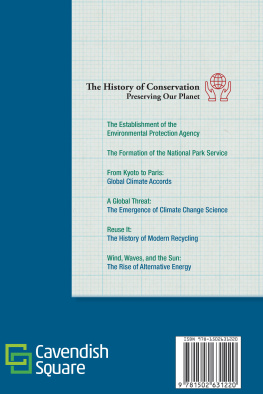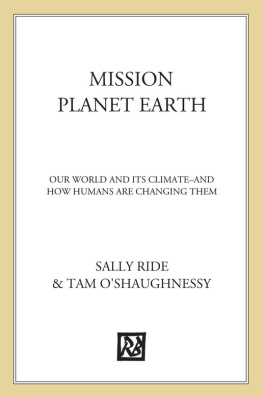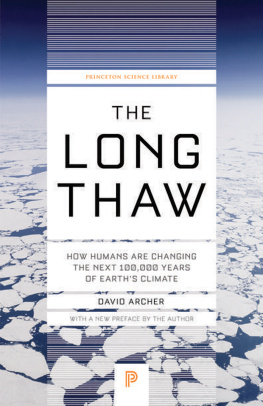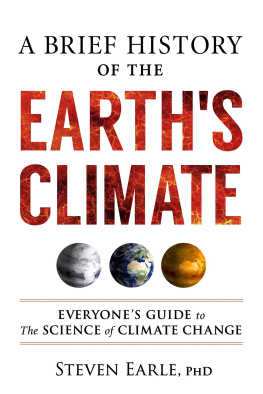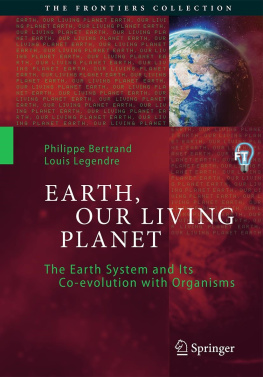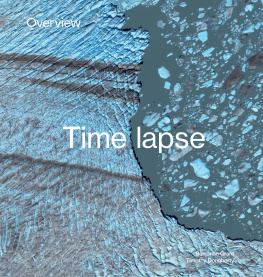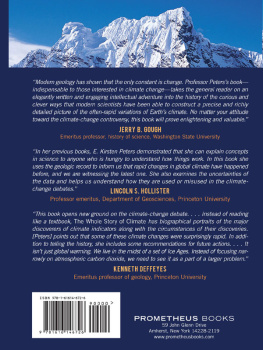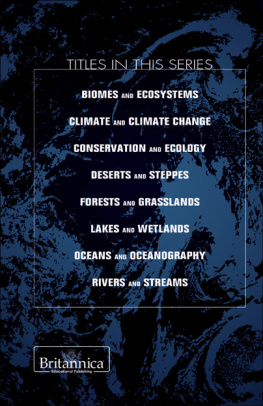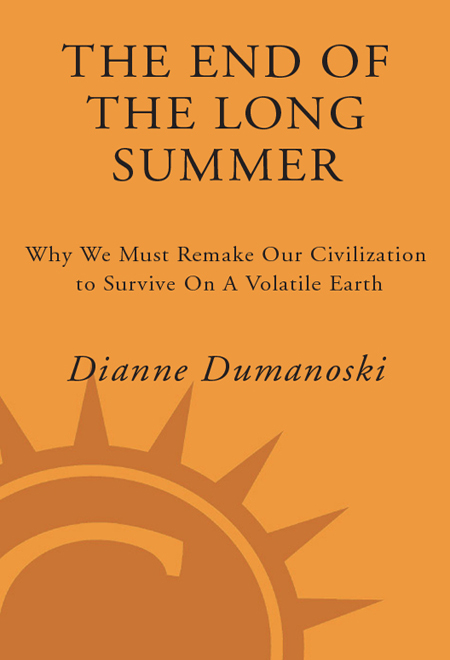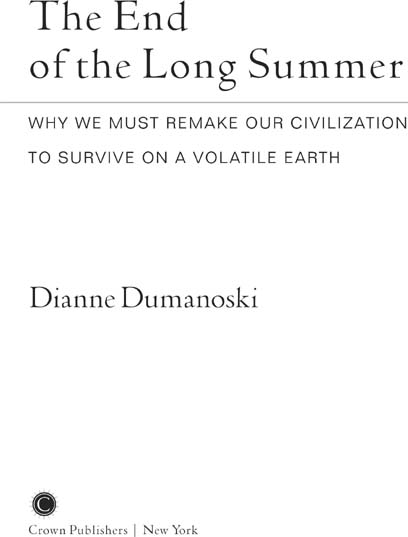1
The Future Head-On
T he future in the modern imagination has always stretched out ahead like a broad highway drawing us onward with the promise of tomorrow. Now rather suddenly, as it becomes impossible to ignore dramatic physical changes taking place across the Earth, the future looms like an urgent question. Whatever the coming century brings, it will not unfold smoothly as some improved but largely familiar version of life as we know it. This is the only thing that seems certain.
Now that many are beginning to awake to the danger, perhaps we will finally come to understand the stakes in the planetary emergency unfolding all around usan emergency that involves far more than the pressing problem of climate change. Ive long had a bumper sticker pinned to my office door that captures the truth not yet fully grasped. It bears a blue cartoon-like outline of a sperm whale along with the admonition: SAVE THE HUMANS . Whatever else is in jeopardy, this is first and foremost a crisis for humans and our current civilization. Moreover, what confronts us is not a vague prospective danger to an abstract posterity in some future time. The threat is to a child born today.
In recent years, scientists have been drilling into the ice sheets on Greenland and Antarctica and retrieving cores of ice, some almost two miles long, which contain trapped bubbles of ancient airbubbles that record the long history of past conditions on Earth over some 800,000 years and also hold clues to the future. The deep ice tells us many things, but two facts about our situation stand out. First, human activity is pushing the balance of gases in the Earths atmosphere way beyond the normal range at an alarming speed. Second, the world as we know it with agriculture, civilization, and dense human numbers emerged during a rare interlude of climatic gracea long summer of unusual stability over the past 11,700 years. Because of humanitys planetary impact, this benign period is now ending.
Today, the hyperactive growth of industrial capitalism and the burden of increasing human numbers constitute a planetary force comparable in disruptive power to the ice ages and asteroid collisions that have previously redirected Earths history. Since the first Earth Day in 1970 and the 1972 global conference on the environment in Stockholm, there has been growing alarm about the ways human activity everywhere around the globe undermines the renewal powers that sustain local and regional ecosystems. More recently, however, scientists began reporting ominous developments heralding dangers of a whole new order. In the second half of the twentieth century, the relentless expansion of modern industrial civilization started to impinge on the invisible, global-scale cycles that make up the Earths essential life support. The human enterprise had become an agent of risky global change that now threatened to undermine fundamental parts of the Earths metabolism.
In the ultimate irony, however, human domination of the Earth has not brought with it the control of nature promised by the modern eras guiding myth of progress. Nor has it brought the end of nature as the author of an early book on global warming lamented. Rather we are already witnessing Natures return to center stage as a critical player in human history. This development, more than any other, will shape the human future.
The urgent question is, simply stated, whether in the face of these changes, the Earth will remain a place that can support complex, interconnected global civilization or, in the extreme, sustain human life.
Over the past two decades, attention has focused on specific symptoms of humanitys global-scale disruption of the environment: the destruction of the ozone layer, climate change, the worldwide loss of species, the growing threats to oceans, pervasive chemical contamination of food webs everywhere on Earth. But these are only signs of broader planetary distress, aspects of a larger story. We need to press beyond the symptoms to discover what fundamentally ails us and to gain a clear-eyed view of where we now find ourselves.
The End of the Long Summer looks anew at the human story and sets forth an account radically different from the onward and upward progress narrative of the modern era. The source of its hope lies not in the belief that humans are destined to achieve dominion but rather in the evidence that we are a stormworthy lineage that has managed to flourish on an increasingly volatile Earth. We come from a long line of survivors who were tempered in the crucible of climatic reversals and catastrophic change. This book also explores the challenge of living in a time of great uncertaintya challenge our forebears faced repeatedly in their evolutionary passageand what this moment requires of us. Above all else, it concerns the obligation to endure. Biologist Jean Rostands resonant phrase, famously quoted by Rachel Carson in Silent Spring, asks us to see ourselves in a longer perspective than our own lives; it reminds us of our responsibility in lifes compact across generations to those who preceded us and to those who will follow. It is time to confront our dilemma squarely and learn how and why we have arrived at this perilous juncture. We need to understand what we are up against if we are to make wise decisions about how to proceed in a time of growing danger.
In my work as a journalist, I spent more than a quarter century on the front lines of the crisis in nature, witnessing firsthand the destructiveness of the modern human enterprise. Ive served as a chronicler of loss and a messenger of warnings over the time that this crisis has escalated from the early concerns about dirty air and dirty water of that first Earth Day to the current global jeopardy of deteriorating and unstable planetary systems. As the situation worsened, those trying to remedy the multiplying symptoms of stress have hurtled from one emergency to another, running faster and faster on an accelerating treadmill of crisis. Treating symptoms has been akin to chasing brush fires. Finally there is no choice but to take on the pyromaniac.
Our dilemma is more than an environmental crisis. The modern era has been a radical cultural experiment. Without question, it has been spectacularly successful in the short run at producing wealth and comfort for more people than ever before. But this success entails a dangerous gamble. The global civilization that now dominates the world has departed fundamentally from practices that have helped ensure human survival in the longer run.
If we are to come to grips with this planetary emergency, we need to understand the process that drives it. Most of all, we need to see how our current modes of thinking fuel this emergency and at the same time increase our vulnerability to the consequences. The inherited assumptions we bring to the situation impair our assessment of the dangers. In this new historical landscape, we not only continue to intensify the physical crisis through exponential growth. Perhaps more important, we also struggle to understand and resolve our dilemma using ideas about the world that are now obsolete and dangerous.
This failure of fundamental ideas lies at the heart of the broader human crisis. Modern industrial civilizations recent capacity to disrupt essential planetary systems has precipitated stunning events, such as the appearance of the Antarctic ozone hole, that challenge our cultures view of the world. The past two decades have raised fundamental questions about human power, the nature of the world we inhabit and act upon, and humanitys place in it. This broader crisis cannot be remedied through increased scientific research or short-term technological fixes. In this new era, our inherited cultural map lies in tatters and needs serious revision to serve as a reliable guide. The question of whether we correctly understand both our own presence on Earth and the nature we disrupt is not merely a philosophical concern. It bears directly on practical decisions that lie ahead and on the deep, longer-term changes needed to redirect the human enterprise onto a safer course. For four centuries, it did not seem to matter that the vast construct of modern civilization rested on an inaccurate view of nature or that our cultural map was missing vital information.


